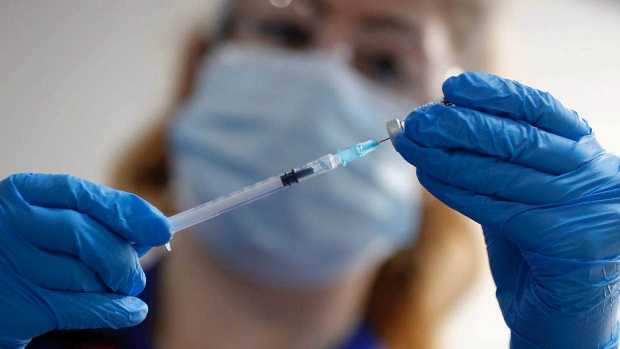Solidarity is failing: EU and UK fight over scarce vaccines
By Benjamin Mueller and Matina Stevis Gridneff
LONDON — The vaccine wars have come to Europe.
For months now, wealthy countries have been clearing the world’s shelves of coronavirus vaccines, leaving poorer nations with little hope of exiting the pandemic in 2021. But a fresh skirmish this week has pitted the rich against the rich — Britain versus the European Union — in the scramble for vials, opening a new and unabashedly nationalist competition that could poison relations and set back collective efforts to end the pandemic.
The European Union, stung by its slow progress on vaccinations, threatened this week to tighten rules on the shipment of Belgian-made shots to Britain.
British lawmakers, in turn, have accused their European counterparts of a blackmail campaign that could embitter relations for a generation.
And poorer countries, already at the back of the line for vaccines, could face even longer waits if the intense squabbling among rich countries drives up prices for everyone else.
The feuding in Europe holds echoes of the dark, early days of the pandemic, when scores of countries banned or restricted the export of protective equipment and medical devices. Nearly a year later, far from abating, that spirit of protectionism has been exacerbated: Not only are vaccine supplies too scarce for many poorer countries to begin inoculations, but wealthy countries cannot figure out how to share the available doses among themselves.
“Science is succeeding, and solidarity is failing,” said Robert Yates, director of the global health program at Chatham House, a London-based policy institute. “The world’s political leaders are letting down the scientists, and everyone else.”
At the core of the problem are production delays at separate factories in Belgium that make the Pfizer-BioNTech vaccine and the one developed by AstraZeneca and the University of Oxford. With a new, more contagious coronavirus variant fuelling a surge of cases in several European countries, those delays have undermined efforts to get shots into millions of people’s arms, ratcheting up the global competition for doses.
But the notoriously tricky manufacturing of vaccines is only part of the problem. Public health experts say the entire global system of buying doses, pitting one country against another with little regard for equity, is unfit to the task of ending a pandemic that respects no borders.
For the European Union, problems with its vaccination campaigns have reinforced criticism of the bloc’s occasionally unwieldy, slow bureaucracy. Unable to speed up vaccine makers, the bloc’s leaders have instead resorted to threats about the export process, a sign of the severe pressure facing them as the European Union falls far behind Britain and the United States, which made advance purchases of vaccines earlier and have been quicker to authorize the shots and get people inoculated.
“The prestige of the European Union is founded on a perception of competence, particularly when you go to different peripheries of the continent, where people think that Brussels is going to be more competent than the national authorities,” said Bruno Maçães, an author and a former politician in Portugal. “You can see a sense of desperation in the last couple days.”
Many European countries, rich and poor, have been hoping that the arrival of the AstraZeneca-Oxford vaccine would hasten the pace of vaccinations, owing to its lower price and simpler storage requirements, compared with those from Pfizer and Moderna. The bloc’s drug regulators are expected to authorize the vaccine Friday (29), a month after Britain did.
But AstraZeneca told the European Union at a teleconference last week that it was going to slash its scheduled deliveries to 31 million doses by the end of March, less than half of the 80 million doses the bloc had been expecting.
EU officials were aghast. The news came on top of an announcement from Pfizer that it had to slow its own vaccine deliveries so that it could upgrade its Belgian factory.
With member states incensed, the European Commission reacted Monday (25) by saying that all coronavirus vaccines made within the bloc would require special paperwork to be shipped elsewhere. That put Britain’s supply of Pfizer-BioNTech vaccines at risk: Unlike its supply of the AstraZeneca vaccine, which is being produced in British plants, its shipments of the Pfizer-BioNTech vaccine come entirely from a factory in Puurs, Belgium.
European lawmakers justified the move by saying it would allow them to monitor how companies were distributing vaccines, and hold them accountable.
“This isn’t about EU first,” the German health minister, Jens Spahn, said in a televised interview Tuesday (26), “but Europe’s fair share.”
European officials have implied that AstraZeneca, headquartered in Britain, sent vaccines to Britain that were meant for the continent instead. They said suggestions by AstraZeneca that the company had been hit by manufacturing problems at its Belgian factory could not explain the steep drop in delivery volume.
AstraZeneca, for its part, has said that Britain’s supply of vaccines has come from the country’s own plants, and not Europe. “We have not diverted any supply from the Europe supply chain to countries outside the EU,” a company spokesperson said Tuesday.
Relations between Britain and the European Union were already testy after more than four years of wrangling over Brexit, which was finalized just weeks ago, and British lawmakers reacted with fury to being blamed for the bloc’s vaccine problems. David Jones, a Conservative lawmaker, told a British newspaper that “this looks awfully like blackmail,” saying it “shows why we were right to leave the EU”
Analysts said the spat was indicative of rising tensions over the large lead Britain has in inoculation, having given vaccines to 10% of its people, compared with about 2% in the European Union. Britain was the first country to authorize a fully tested coronavirus vaccine, and the government of Prime Minister Boris Johnson has trumpeted its successes.
-New York Times


